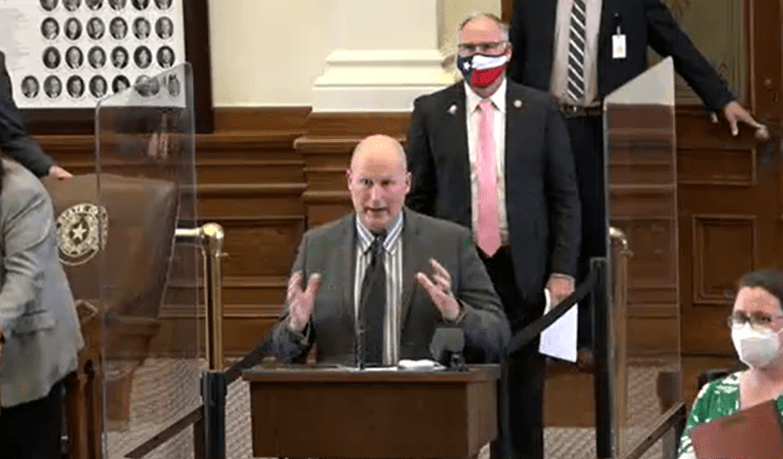On Tuesday, the House convened for a total of 22 minutes. Within that time frame, they gaveled in and considered a resolution permitting them to adjourn for more than three days during the period beginning on Wednesday until next Tuesday, March 9.
Consideration of the HCR
While the resolution was being considered, State Rep. Tony Tinderholt (R–Arlington) stood up to ask State Rep. Will Metcalf (R–Montgomery), author of the HCR and chairman of the House Administration Committee, some questions. The exchange went as follows:
Tinderholt: “I have concerns because there is a lot going on. We have heard both the governor and the lieutenant governor, as well as the speaker, talk about the fact that we are running out of time potentially for some of this stuff. Why would we be leaving for five days? And the reason that I ask that is because my constituency would like for us to be here doing work on behalf of the people. So I just have concerns. What would we be leaving for five days for at such a critical time?”
Metcalf: “Mr. Tinderholt, we will be working in committees. I was on State Affairs, and on Thursday and Friday, we met for over 25 hours plus. And so, we are doing the people’s work.”
Tinderholt: “Do you think that if we all stayed for the additional five days that we could get additional work done, or do you think that the committees are going to be able to hear the bills and do the things that we need to be here for?”
Metcalf: “Committees are in the process of working.”
Tinderholt: “My concern is this is the least amount we have done, and this is my fourth session. We have some huge issues to tackle. I am going to be voting ‘no’ on this like I did last week. I wanted to come up and make sure you knew that I am going to be voting ‘no’, and I don’t want to leave for five days because my constituency wants me here doing the people’s work. So thank you, sir.”
Metcalf: “Members, I move adoption.”
The Record Vote
House Concurrent Resolutions require a record vote. Interestingly, 27 legislators voted against leaving for five days. These legislators include:

Per, Section 17, Article III of the Texas Constitution, both chambers are required to approve a resolution allowing the other to adjourn for more than three days. When this resolution was considered in the Senate, it passed unanimously.
Objections are Growing
Last week, Metcalf authored a similar resolution allowing the Legislature to adjourn for more than three days between February 23 and March 2. The following members voted against its adoption:

Likewise, when considered in the Senate, it passed unanimously.
In Context
Though the Legislature cannot consider bills that are not emergency priorities directed by the governor within the first 60 days, they have had the ability to refer bills that have been filed and consider them in the committee process since the formation of committees a few weeks prior.
The House was reluctant to refer any bills until late last week and thus far has referred 986 bills of the 2,829 filed (35 percent). When compared to previous legislative sessions, the House is still significantly behind in doing so. The Senate has thus far only referred 280 of the 953 bills filed (29 percent).
Of the total 51 days since the beginning of the 87th Legislative Session, the House of Representatives has met for about 12 hours and the Senate has met for about seven hours. By this time during the 86th Legislative Session, the House had met for about 40 hours and the Senate about 24 hours. In the 85th Legislative Session, the House had met for about 48 hours and the Senate about 37 hours.
No doubt, the Legislature is moving slower. As the days continue to pass in session, however, it remains to be seen if objections from lawmakers will continue to arise.





